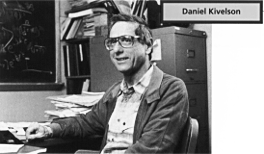DANIEL KIVELSON 
Professor; BS, MS and PhD, Harvard University; John Simon Guggenheim
Fellow; Alfred P. Sloan Foundation Fellow; NSF Senior Postdoctoral Fellow;
ACS California Section Award; Harvey L. Eby "Art of Teaching" Award; Herbert Newby McCoy Award; Fulbright Fellow; Professeur Associé de l'Université Pierre et Marie Curie; Fellow American Physical
Society; UCLA College of Letters and Sciences Award.
RESEARCH DESCRIPTION:
The central theme of our research, both experimental and theoretical,
is molecular motions in liquids. These motions determine the macroscopic properties of liquids and play a role in chemical reactions. Experimentally
we make use of dynamic light scattering, correlation spectroscopy, various acoustic techniques, viscosity determinations, and magnetic resonance. The theory used is time-dependent statistical mechanics. We have also
examined molecular motions by means of computer simulated molecular
dynamics.
Recently we have been examining the viscoelastic behavior of supercooled liquids, behavior which is solid-like and not usually associated with
liquids, but which becomes pronounced in highly viscous liquids subjected to high frequency disturbances. For supercooled liquids the viscosity and equilibration time increase catastrophically as the temperature is lowered.
In addition, the manner in which the system equilibrates after being
perturbed is more complicated for supercooled than for ordinary liquids. Fundamental changes in the molecular structure and dynamics of liquids
take place as the glass transition is approached and we now have some
evidence that fluctuating clusters develop near the transition
temperature.
It has long been known that the solvent affects the activation
energy of a reaction in a liquid, but less is known about its time-dependent contributions. In a simple case, the chemical reaction can be envisaged
as the passage of a quasi-particle along a reaction coordinate and across an activation barrier; in a liquid the quasi-particle's passage is impeded
by solvent-induced friction. We are trying to understand this friction.
KEY CONCEPTS AND WORDS:
Physical Chemistry: molecular theory of transport and relaxation in
liquids, viscoelastic fluids, glasses and bilayers; dynamic light
scattering; theory of chemical reactions in liquids; magnetic resonance
and spin relaxation.